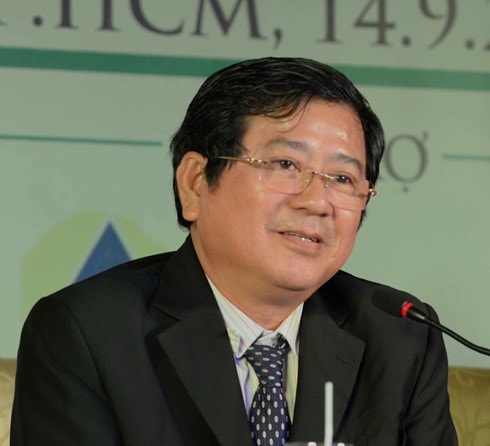Prohibiting people from secretly recording audio and video: Is it unconstitutional?
According to lawyers, prohibiting people from secretly recording audio and video is unconstitutional and contradicts many specialized laws.
The draft Decree regulating the business conditions for camouflaged software devices used for recording, filming, and positioning that the Ministry of Public Security is drafting, including regulations restricting the subjects using the software, is receiving mixed opinions from the public. On this issue, VOV reporter interviewed lawyer Nguyen Van Hau - Vice President of the Ho Chi Minh City Lawyers Association.
 |
Lawyer Nguyen Van Hau - Vice President of Ho Chi Minh City Bar Association (Photo: NVCC) |
PV:The draft regulation on business conditions for camouflaged software devices used for recording, filming, and positioning that the Ministry of Public Security is drafting has limited the subjects of use. From the perspective of a lawyer, how do you view this regulation?
Mr. Nguyen Van Hau: In the recent consultation, public opinion disagreed because this provision is not in accordance with the spirit of the Constitution. That is, when restricting business conditions, it must be restricted according to the law, especially restricting civil rights and human rights, it must be raised to the level of law. These restrictions compared to the Enterprise Law, it is not time to issue such regulations.
PV:According to you, this draft Decree is unconstitutional and contradicts other regulations?
Mr. Nguyen Van Hau:We believe that this document is unconstitutional. If it is issued in a way that prohibits its use, it will be difficult to implement in real life and will not explain other legal provisions because they overlap with each other, such as the Press Law, the Lawyers Law, etc. Those specialized laws also assign authority to conduct evidence as well as the functions and tasks of each profession.
PV:The name of the Decree is to regulate the business conditions for camouflaged software devices used for recording, filming, and positioning, but the subjects of application include non-business people. In your opinion, is there a contradiction in the Draft?
Mr. Nguyen Van Hau:When we issue a legal regulation, we must consider whether it is unconstitutional or not, whether it overlaps with other laws. Because other laws also regulate this issue when they implement specialized laws. Therefore, if this Decree is passed, it will not guarantee the rights and obligations of individuals, and will not ensure the construction of human rights and civil rights. If individuals use these devices to commit illegal acts, the Criminal Law, Civil Law, etc. have already been adjusted. If it is regulated in such a specific way, I think that the legislative technique has loopholes, so there needs to be a counter-argument.
PV: Recently, there have been many cases of dirty food, corruption and negative cases exposed by the press and people, reflected to public opinion thanks to the effective support of specialized camouflaged recording and video equipment. Now, the draft regulation restricting the use of camouflaged recording and video equipment will have what consequences on the mobilization of people as well as society to fight against corruption and other types of crime, sir?
Mr. Nguyen Van Hau:If such a regulation is made, it will not ensure the community's cooperation in the current struggle to protect political security and social order, especially in the work of preventing and combating corruption. That will be a step backward in legislative activities.
PV:At the recent meeting, Chairman of the Central Committee of the Vietnam Fatherland Front Nguyen Thien Nhan also expressed his opinion on carefully reviewing this draft regulation. Citing the incident that just happened in the US when a passenger was dragged off a United Airlines (UA) plane, Mr. Nguyen Thien Nhan showed the role and practical significance of citizens being allowed to record audio and video. If it is banned, people will not know about the incident and it will be buried. Will the Fatherland Front have an opinion at the upcoming regular Government meeting, sir?
Mr. Nguyen Van Hau: I agree with this opinion because it is undeniable evidence in the case of United Airlines (UA). Without these recording devices, how can agencies and the press have evidence in preventing and fighting corruption? That is also evidence to fight against social evils. Therefore, public opinion does not agree with the draft Decree on this matter.
PV: This shows the need for the involvement of the Ministry of Justice and other organizations, sir?
Mr. Nguyen Van Hau:Social organizations and the Ministry of Justice, which have the function of gatekeepers, need to take drastic measures to prevent documents that go against the Constitution from being passed. This is also a step to limit the basic rights of citizens in preventing and fighting against current negativity and corruption, thereby helping people have a basis to request public agencies to protect their legitimate rights and interests.
PV: In the context of the current explosion of social networks and technology, in your opinion, how should authorities manage to promote the role of social networks and technology and limit and prevent acts of exploiting it with bad intentions, instead of having a prohibition mindset?
Mr. Nguyen Van Hau:I think that we need to improve the way of management. We manage society by law, on the basis of law there must be another way of management, not just if we cannot manage then we issue a ban. This ban makes the level of those who perform public duties if they follow the old way, they will not develop the reality that society is on the way to innovation, especially administrative and judicial reform, reform of innovation in the public sector has not really made a breakthrough.
PV:Thank you, sir./.
According to VOV
| RELATED NEWS |
|---|
